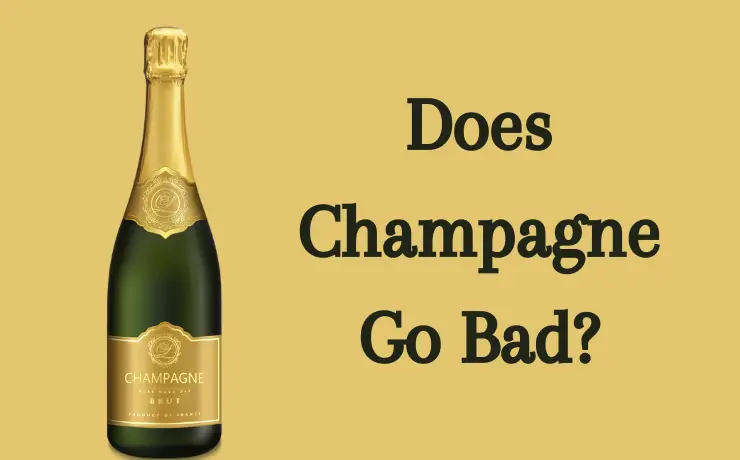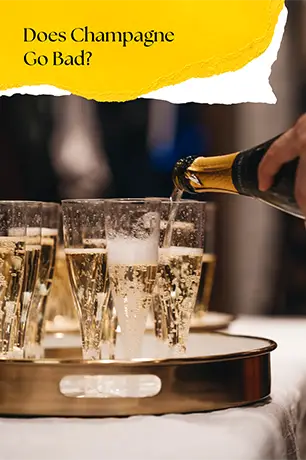For the connoisseurs, aficionados, and even casual drinkers, one question may loom in the corner of your mind: Does champagne go bad? This bubbly delight, often associated with luxury and celebration, comes with its own set of chemical and microbiological complexities. Let’s dive into the heart of the matter, employing rigorous science and an engineer’s precision.
To help you navigate the world of spirits, we also have articles on whether Does Rum Go Bad, Does Campari Go Bad, Does Tequila Go Bad, Does Brandy Go Bad, Does Gin Go Bad, Does Vodka Go Bad, Does Whiskey Go Bad, Does Triple Sec Go Bad, and Does Beer Go Bad. Let’s explore the specifics of Triple Sec and give you the essential information you need.
Does Champagne Go Bad?
Does Champagne Go Bad? To put it simply, yes, Champagne can go bad. While it doesn’t spoil in the way that perishable foods like milk or meat do, its quality can certainly degrade over time. Factors such as storage conditions, oxidation, and even microbial growth can influence its flavor, aroma, and overall quality.
| Factor | Effects on Champagne |
|---|---|
| Oxidation | Loss of fizz, stale aroma |
| Light Exposure | Discoloration, altered flavor |
| Temperature | Accelerated aging |
| Microbial Growth | Off-flavors, spoilage |
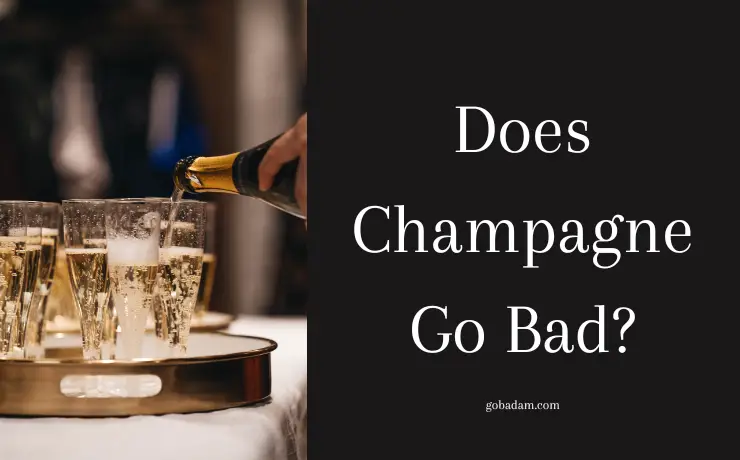
Opened Champagne Go Bad?
Once a bottle of Champagne is opened, the carbon dioxide that gives it its characteristic bubbles starts to escape. The oxidation process is accelerated, and the beverage will start to lose its crispiness and flavor within 3-5 days if resealed and stored in the refrigerator.
In extreme cases, microbial contamination might occur, although the alcohol content often acts as a preservative. However, once the effervescence is gone, it will not return; thus, some might argue that the Champagne has “gone bad” in the sense that it has lost its defining characteristic.
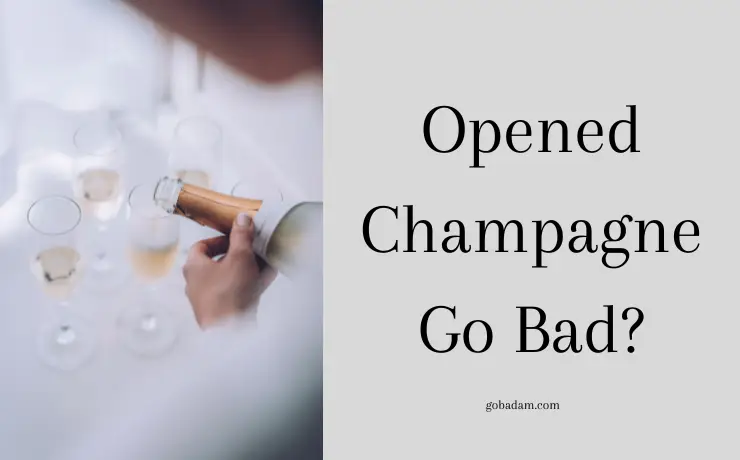
How To Tell If Champagne Is Bad?
You can tell if the champagne is bad by its color, smell or taste. If you think your champagne has gone bad, it’s a better idea to buy new.
- Discoloration: Champagne should have a bright, golden hue. Any browning or dull appearance indicates age or poor storage.
- Smell: A stale, musty, or sour aroma is a clear indicator that the Champagne has gone bad.
- Taste: The flavors should be crisp and lively. A flat or off-flavor is a sign that it is past its prime.
How To Store Champagne
When it comes to storing Champagne, it’s crucial to consider the environment carefully. The temperature should be between 55°F and 57°F for short-term storage. While placing a bottle of Champagne on display in your liquor cabinet may be visually pleasing, it’s far from ideal for maintaining the beverage’s quality.
Sunlight and fluctuating temperatures can significantly affect the wine’s chemistry. For this reason, opt for a cool, dark place like a pantry or cellar, where conditions are stable and sunlight is minimal.
If you are planning to store your Champagne for an extended period, especially if it’s a vintage bottle, it would be best to store it horizontally. This position helps keep the cork moist and minimizes the risk of it drying out, which can lead to accelerated oxidation of the wine. However, the commonly followed practice for non-vintage or short-term storage is to keep the bottle upright to reduce the surface area exposed to air, thereby slowing down the oxidation process.
As you approach the time to enjoy your Champagne, transfer it to the fridge a few hours before you intend to open it. Champagne is best enjoyed chilled, and this will bring it to the optimal serving temperature. If you find that you have leftovers after opening, reseal the bottle and store it in the refrigerator to maintain its effervescence.
If the original cork doesn’t fit, a specialized wine stopper or champagne sealer can be used. In a pinch, plastic wrap secured with a rubber band can serve as a makeshift seal for a day or two, although this is not the most effective method for retaining the Champagne’s characteristic fizz.
🎯 Check out these special glasses to drink Champagne with pleasure!
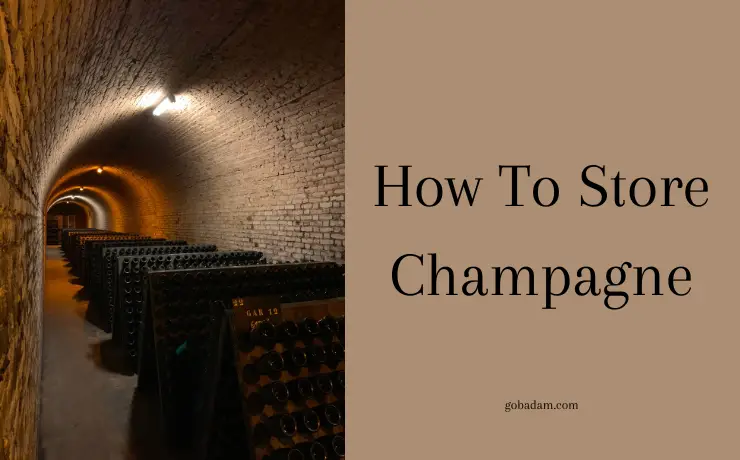
Storage Champagne Short Term
For storing Champagne in the short term, keep the bottle upright in a cool, dark place like a pantry or cellar. The ideal temperature should be between 55°F and 57°F. Avoid areas exposed to sunlight or fluctuating temperatures.
Storage Champagne Long Term
If you’re planning on long-term storage, especially for vintage bottles, lay the bottle horizontally to keep the cork moist. Store it in a dark, stable environment with a constant temperature of around 53°F and humidity levels between 60-70%. This minimizes oxidation and preserves quality.
How Long Does Champagne Last?
In the world of Champagne, there are two primary classifications that significantly influence the beverage’s longevity: single-harvest vintages and multi-harvest blends, commonly referred to as vintage and non-vintage Champagnes, respectively.
Vintage Champagnes are sourced from a single year’s harvest, which gives them a unique quality and depth. These bottles are often pricier and are intended for longer aging. Non-vintage Champagnes, composed of a mix of grapes from several years, are generally best enjoyed sooner and are often more budget-friendly.
An unopened bottle of vintage Champagne can maintain its quality for over a decade when stored correctly. So if you’ve been saving a bottle of, say, Krug or Dom Pérignon, rest assured that its longevity is on your side. On the flip side, non-vintage options are generally best consumed within a 3-5 year window post-bottling. While they won’t necessarily “spoil” after this period, you may notice a decline in the effervescence and vibrancy that make Champagne so captivating.
Now, let’s talk about the open bottles. Once you uncork a bottle of Champagne, its lifespan shortens drastically. Properly resealed and refrigerated, you can expect to enjoy its bubbles for 3 to 5 days. However, as each day passes, the carbonation lessens, and the flavor profile shifts.
The bottle you enthusiastically opened for a birthday or anniversary celebration will have noticeably fewer bubbles and less of that classic zest after a few days. After this period, the Champagne won’t spoil, but it may lose its iconic sparkle and taste.
To encapsulate, here are some general guidelines for Champagne’s shelf life in optimal conditions:
Non-vintage Champagne (unopened): 3-5 years
Vintage Champagne (unopened): 10+ years
Champagne (opened): 3-5 days with proper resealing and refrigeration
Remember, these figures are general guidelines for best quality and do not indicate spoilage. While the drink might lose its fizz or flavor, it’s generally safe to consume for a much more extended period.
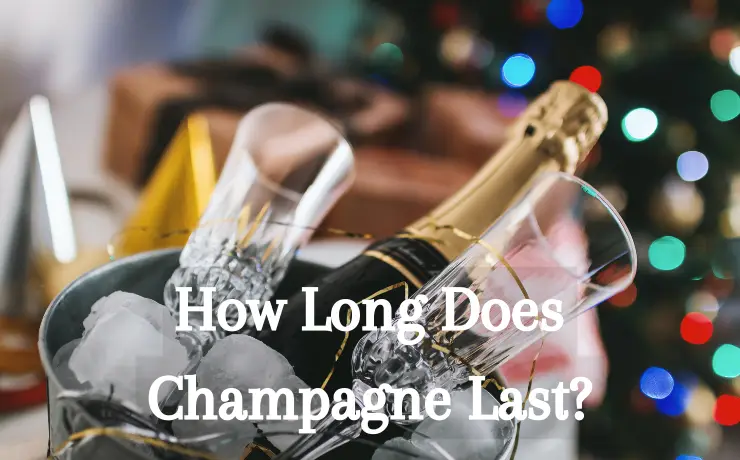
Champagne Expiration Date
Champagne doesn’t usually come with an expiration date, but vintages do provide a production year. Older vintages should be consumed sooner, whereas non-vintage bottles can often be stored longer. But remember, even the best-stored Champagne will eventually degrade.
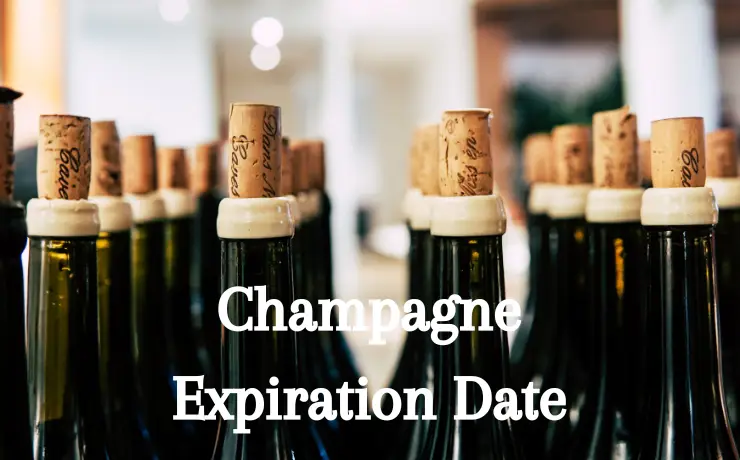
Does Champagne Go Bad FAQ
Let’s take a look at the questions in addition to the answers to how long does champagne last and does it go bad?
Does Champagne expire?
No, Champagne doesn’t technically “expire,” but its quality does diminish over time. Unopened bottles can last for years if stored correctly, while opened bottles should be consumed within 3 to 5 days to maintain optimal flavor and effervescence.
How long can you keep Champagne after opening?
If resealed and refrigerated promptly, an opened bottle of Champagne can maintain its quality for 3 to 5 days.
Can you drink old Champagne?
Yes, you can drink old Champagne. While it may lose its fizz and some flavor complexity, it’s generally safe to drink.
What are the signs of bad Champagne?
A change in color, a musty odor, or a lack of bubbles are indications that your Champagne might be past its prime.
How should you store an opened bottle of Champagne?
Re-cork the bottle or use a Champagne stopper and store it in the refrigerator to extend its life for a few days.
Do different types of Champagne spoil at different rates?
Yes, vintage Champagnes usually have a longer shelf life than non-vintage options due to their aging process and complexity.
Is it safe to drink Champagne with sediment?
Sediment is generally harmless and can occur in older bottles of Champagne. It may affect the clarity but is safe to consume.
What happens to Champagne if not stored properly?
Improper storage can lead to oxidation, loss of carbonation, and a decline in flavor quality.
Can bad Champagne make you sick?
While stale Champagne may have a less pleasant taste and fewer bubbles, it is unlikely to make you sick unless it has been contaminated.
Does temperature affect how long Champagne lasts?
Yes, extreme temperature fluctuations can adversely affect the Champagne’s quality and longevity.
Is vintage Champagne more long-lasting than non-vintage?
Yes, vintage Champagne is generally made to be aged and can last for over a decade when stored correctly.
How does Champagne’s shelf life compare to other sparkling wines?
Champagne typically has a longer shelf life than other sparkling wines due to its production methods and aging process.
What’s the optimal temperature for Champagne storage?
For long-term storage, aim for a stable temperature between 53°F and 57°F.
Can you freeze Champagne to extend its shelf life?
Freezing is not recommended as it can cause the bottle to crack and spoil the wine’s complex flavors.
Does re-corking affect how long opened Champagne lasts?
Re-corking or using a Champagne stopper can help maintain its effervescence for a few more days when stored in the refrigerator.
How to preserve Champagne bubbles once opened?
Using a specialized Champagne stopper will help preserve the bubbles. Keep the resealed bottle in the refrigerator.
Are there any health risks associated with drinking expired Champagne?
Generally, there are no health risks, although the taste and experience will be compromised.
Can Champagne go bad if exposed to sunlight?
Prolonged exposure to sunlight can cause Champagne to oxidize, which will adversely affect its taste and color.
What are the storage recommendations for sparkling Rosé Champagne?
Like other Champagnes, sparkling Rosé should be stored upright in a cool, dark place for short-term storage and horizontally for long-term storage.
Is the shelf life of a Magnum bottle of Champagne different from a standard bottle?
Magnum bottles often have a longer shelf life due to the lower surface area-to-volume ratio, which allows for slower aging.

